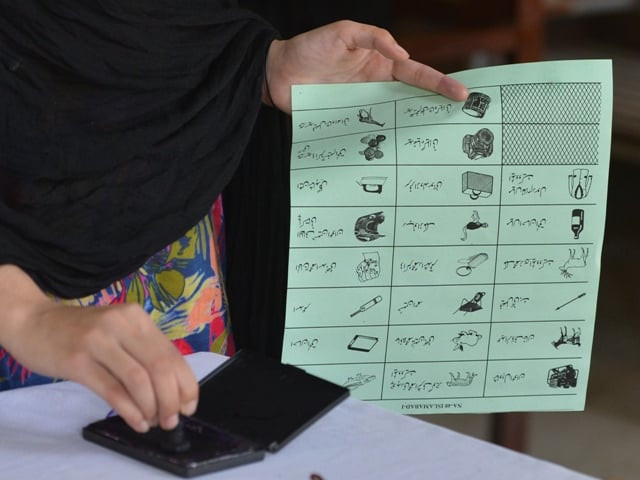Balochistan LG polls: Observers highlight weaknesses, irregularities in system
No contest was witnessed on 513 of the 11,754 seats.

The EAM analysis of Quetta shows a 5 per cent decrease in the number of voter turnout. PHOTO: AFP/FILE
The Local Government (LG) Elections held in Balochistan last month were systematically weaker than the general elections held earlier last year, says an international observers report.
The report focuses on the legal framework of LG polls held in the violence-hit province as well as the practicality of it during the process.
Titled “Balochistan Local Government Elections”, the report compiled by the Election Assessment Mission (EAM) of Democracy Reporting International (DRI), a Berlin-based independent organization, was released here on Wednesday.
It highlights the fact that out of the total 450 permanent staff working under the provincial and district election commissioners, only 226 were temporarily assigned the responsibilities of returning officers (RO).

They too belonged to the civil administration and not the judiciary hence as many as 70 per cent of them were biased towards the party of the minister that they serve.
The mission observed that the ROs lacked training and oversight by the Election Commission of Pakistan (ECP) which also failed to make necessary election material available on time, and even after their availability, them being in English language added to the frustrations of the voters --- mostly speaking Balochi, Pashto and Brahvi.
No contest was witnessed on 513 of the 11,754 seats (7 per cent) on which the ECP is planning to hold by-elections on January 19 so the local bodies become functional.
At 2,509 constituencies (35 per cent) only one candidate per seat was in the run, thus it can safely be assumed that only 4,168 (58 per cent) of seats were contested properly, states the report.
An average of 3.7 candidates came head to head in such constituencies. The EAM analysis of Quetta shows a 5 per cent decrease in the number of voter turnout.
The official results announced on January 9 notified the winning candidates without citing the number of votes they had bagged.
DRI’s Country Director Vladimir Pran startlingly revealed that in ward six of a union council in Quetta District, the winning candidate managed to secure only four votes out of potential 1,764 on the electoral roll.
“This is 0.2 per cent of the total potential voters which, in rounded figures, is 0 per cent. In some of the other constituencies, not even a single vote was casted,” he informed.
The provincial government’s excessive use of power and discretion, late completion of delimitation, voter inequality, and non-availability of crucial information to public were identified as the main problems by the mission which further maintained that ballot printing errors were also reported in 17 districts prior to the election day.
Other issues brought to light by the report included a lack of scrutiny by the media and that of observation by the civil society apart from an unclear system of dispute resolution.
“Granted the elections were held in difficult circumstances but still, many of the problems -- profound and multiple --- could be avoided,” said team leader of the EAM and previously Deputy Chief Observer of the European Union Election Observation Mission to Pakistan, Hannah Roberts.
DRI conducted the assessment under its European Union-funded project supporting advocacy for electoral reform in Pakistan. The report was earlier launched at a day-long seminar held in Quetta on Monday where over 150 participants, including members of provincial assembly, political parties’ representatives, ECP staff, local government officials, media and civil society had participated.
Published in The Express Tribune, January 16th, 2014.





1724319076-0/Untitled-design-(5)1724319076-0-208x130.webp)













COMMENTS
Comments are moderated and generally will be posted if they are on-topic and not abusive.
For more information, please see our Comments FAQ